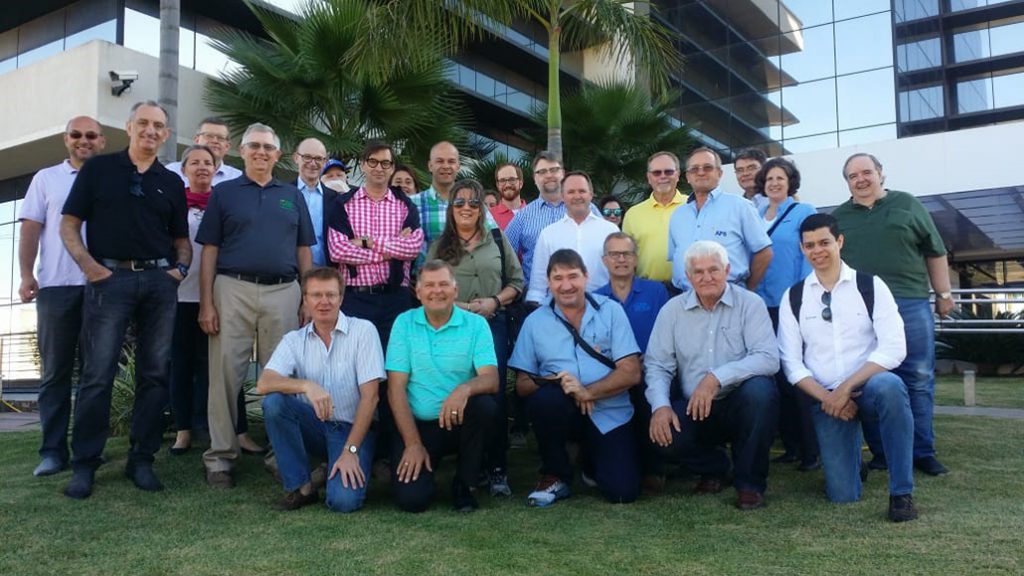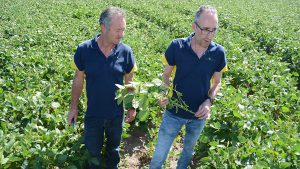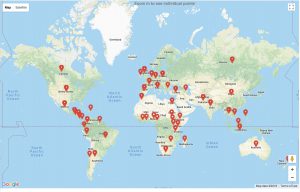An international dialogue
GLOBAL CONFERENCE OFFERS OILSEED INSIGHTS

THE ANNUAL MEETING of the world’s leading oilseed producing nations, the International Oilseed Producers Dialogue (IOPD), had an air of uncertainty this year due to political talks of trade disruptions. Grain Farmers of Ontario chair Markus Haerle attended the 2018 event in July in Cuiabá, Brazil and said, “all countries attending the conference were concerned with displacing market access and how oilseed production will be impacted.”
The IOPD brings together representatives from oilseed farmer associations from many of the largest oilseed-producing countries, representing commodities including soybeans, canola, and rapeseed. Most of the countries are competitors on the world market, but still meet annually for an open dialogue session focusing on commonalities and issues facing the international industry. Many of the discussions focus on policy and regulations, market access, and the future of the oilseed industry. The 2018 conference was hosted by the Matto Grosso chapter of Aprosoja, the Matto Grosso Soybean and Corn Growers Association, and included farm and processing tours of Brazil’s soybean industry.
CANADA’S PERSPECTIVE
Each year the dialogue changes, but the IOPD agenda is standard, giving every country an opportunity to present their perspective on their domestic oilseed industry. Haerle presented alongside Jack Froese, fellow Canadian delegate and president of the Canadian Canola Growers Association. Together, they outlined policy issues impacting Canadian oilseed farmers, including the changing trade climate, public trust, rail transportation, sustainability and the environment, business risk management, and innovations and investments in crop inputs.
“The presentation gave us a chance to layout our capabilities as a canola and soybean producing country,” says Haerle. “Not all of the oilseed producing countries have the same regulations, and that’s making it harder for Canadian soybean growers to compete on the world market. Especially when it comes to crop inputs like regulations on seed treatments that put us at a disadvantage.”
Haerle noted all countries and industry representatives mentioned trade disruptions and the market pressures that result from the unpredictable market climate in their respective presentations.
RESOLUTIONS
The IOPD resolution process is another major agenda item for the event where resolutions from the previous event are reviewed, common issues discussed, new resolutions are made, and action items are assigned to the new resolutions.
“The World Trade Organization looks to these resolutions as benchmarks for the purpose and needs of the oilseed industry,” says Haerle. “The IOPD resolutions are also used by individual countries to help negotiate regulations and policies with their own governments on international issues.”
This year’s resolutions focused on sustainability and public trust, innovations for future generations, renewable energy and bio-based products, and trade. All resolutions are motivated by improving the international oilseed industry, trade, and market access.
WHAT TO WATCH FOR
This year’s conference saw a proposal put forward by Brazil to change the current soybean grading standards from the current visual-type system to one that would be based on measurable oil content, protein content, and digestibility.
“The new grading standards proposed could be a game changer, significantly impacting how soybeans are traded and graded. And these could change how Canadian soybeans compete in the global market,” says Haerle, explaining that since growing climates impact the composition of soybeans, the proposed grading system may offer South American growers a competitive advantage.
“Warmer climates produce soybeans with higher protein and oil content and processors can take advantage of the new grading system.”
The new grading system proposal will be discussed further at future IOPD meetings, but Haerle notes this proposal could have global trade implications, and is one to watch.
“Change could be on the horizon and if the grading proposal goes through, it could impact all oilseeds, not just soybeans,” warns Haerle.
Research and plant breeding discussions also centered around policy and trade regulations.
“New plant breeding methods such as gene editing are advancing crop production and quality, but not all countries are accepting them,” says Haerle. “While gene editing is not genetically modifying a plant, some countries like the European Union have different plant breeding standards and may not accept them.”
The infrastructure and transportation of commodities within oilseed producing countries has always been another matter competing countries keep close tabs on. For example, Brazil has been working to improve transportation from field production to processors and ports for exporting.
“And if successful, Brazil could quickly become the biggest player on the global soybean market,” says Haerle, who also notes transportation could be a challenge for Canadian soybeans if soybean production increases in Western Canada.
“Our Canadian presence and attendance at such an event is important to our farmers,” says Haerle. “While Canada is a relatively small producer on the world scale, our opinions are highly respected, and we know what we need to watch out for and prepare for on the current and future global oilseed markets.”
Grain Farmers of Ontario was an active participant in the IOPD conference. •
| IOPD PARTICIPATING COUNTRIES AND ASSOCIATIONS • American Soybean Association (ASA) — United States • APS Soybean, Oilseeds and Cereals Producers of Paraguay Association (APS) — Paraguay • Mato Grosso Soybean and Corn Growers Association (APROSOJA) — Brazil • Canadian Canola Growers Association (CCGA) — Canada • Federation Francaise des Producteurs d’Oleagineux et de Proteagineux (FOP) — France • Grain Farmers of Ontario — Canada • Paraguayan Chamber of Traders and Exporters of Cereals and Oilseeds (CAPECO) — Paraguay • Union zur Förderung von Oel ̶ und Proteinpflanzen (UFOP) — Germany • United Soybean Board (USB) — United States • U.S. Soybean Export Council (USSEC) — United States. |



























